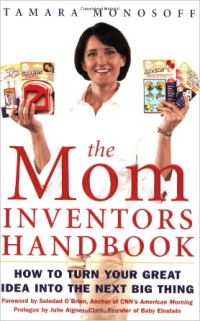The Mom Inventors Handbook

How to Turn Your Great Idea Into the Next Big Thing
I'm the type of person who is continuously annoyed (just ask my wife). I get especially
annoyed when something that should be dirt simple turns out to be a royal pain in the butt.
A wise person would look at each annoying incident as an opportunity to invent something
to solve a problem and get rich. By my experience there are hundreds of thousands of
opportunities out there just waiting for someone to invent something and get rich.
In
The Mom Inventors HandBook Tamara Monosoff (an accomplished inventor herself)
gives you the knowledge and directions to do just that. Now, I would agree that mom's
are the ideal people to take advantage of this book, because running a household requires
lots of creativity and problem-solving skills, but I think men should grab a copy of this book
too and not be deprived of the knowledge and instructions contained within. Don't we
men do car, yard, and house maintenance chores that place us in a position to get problem
solving invention ideas?
Important Tips When Considering an Invention Promotion Company (derived from
The Mom Inventors HandBook)
1. Anyone who gives you extreme assurances that they can get your product licensed,
or is a little too enthusiastic about your product, is probably giving you the hard sell.
2. Insist on a written proposal. Read and ask questions about the fine print. Check the
company's credentials. Be sure you understand what they are committing to (and NOT committing
to) and what they expect of you.
3. Ask to speak to at least two other clients with whom they've worked. Speak to
those clients and ask some questions about their success that you can verify.
4. Be very suspicious of pay-upfront deals. A legitimate operation may require a modest
($100 to $500) upfront payment to be used for the creation of a marketing packet, with
which you would be provided copies. A legitimate company will be compensated mainly
from a percentage of future revenues, referred to as royalties.
Fraudulent companies charge a small upfront fee for a "feasibility study", then they'll
come back with "Great News! Your product can make it big!". Then they'll ask for another
$3,000 to $15,000. After you've paid this money, you never hear from them again.
5. Investigate the company before you make any commitment. Visit
The United States Patent and Trademark Office (USPTO)
and the
Better Business Bureau,
the consumer protection agency, and the Attorney General in your state or city, and in
the state or city where the company is headquartered.
| 
